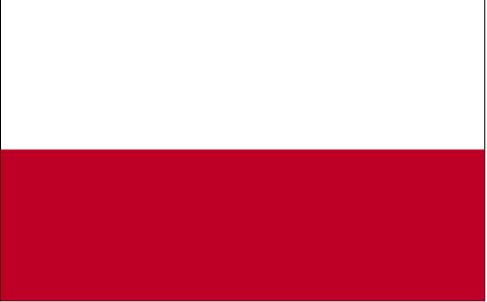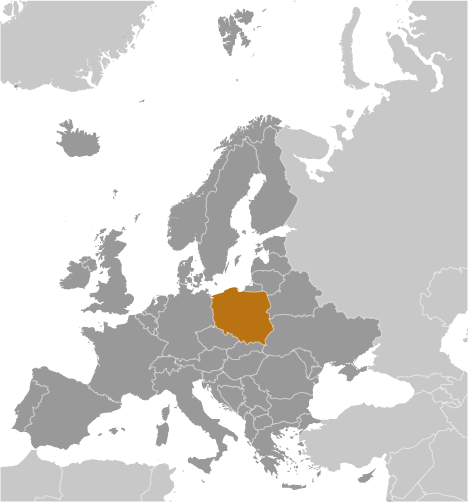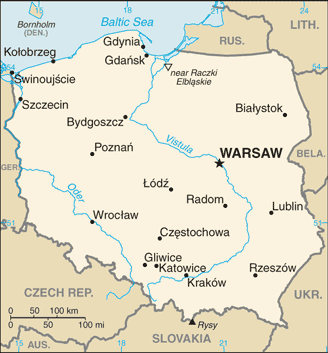Poland is an ancient nation that was conceived near the middle of the 10th century. Its golden age occurred in the 16th century. During the following century, the strengthening of the gentry and internal disorders weakened the nation. In a series of agreements between 1772 and 1795, Russia, Prussia, and Austria partitioned Poland amongst themselves. Poland regained its independence in 1918 only to be overrun by Germany and the Soviet Union in World War II. It became a Soviet satellite state following the war, but its government was comparatively tolerant and progressive. Labor turmoil in 1980 led to the formation of the independent trade union "Solidarity" that over time became a political force and by 1990 had swept parliamentary elections and the presidency. A "shock therapy" program during the early 1990s enabled the country to transform its economy into one of the most robust in Central Europe, but Poland still faces the lingering challenges of high unemployment, underdeveloped and dilapidated infrastructure, and a poor rural underclass. Solidarity suffered a major defeat in the 2001 parliamentary elections when it failed to elect a single deputy to the lower house of Parliament, and the new leaders of the Solidarity Trade Union subsequently pledged to reduce the Trade Union's political role. Poland joined NATO in 1999 and the European Union in 2004. With its transformation to a democratic, market-oriented country largely completed, Poland is an increasingly active member of Euro-Atlantic organizations.
Country Name
Conventional long form:Republic of Poland
Conventional short form:Poland
Local long form:Rzeczpospolita Polska
Local short form:Polska
Government Type
republic
Capital
Name:Warsaw
Geographic coordinates:52 15 N, 21 00 E
Time difference:UTC+1 (6 hours ahead of Washington, DC during Standard Time)
daylight saving time: +1hr, begins last Sunday in March; ends last Sunday in October
Administrative divisions
16 provinces (wojewodztwa, singular - wojewodztwo); Dolnoslaskie (Lower Silesia), Kujawsko-Pomorskie (Kuyavia-Pomerania), Lodzkie, Lubelskie (Lublin), Lubuskie (Lubusz), Malopolskie (Lesser Poland), Mazowieckie (Masovia), Opolskie, Podkarpackie (Subcarpathia), Podlaskie, Pomorskie (Pomerania), Slaskie (Silesia), Swietokrzyskie, Warminsko-Mazurskie (Warmia-Masuria), Wielkopolskie (Greater Poland), Zachodniopomorskie (West Pomerania)
Independence
11 November 1918 (republic proclaimed)
National Holiday
Constitution Day, 3 May (1791)
Constitution
adopted by the National Assembly 2 April 1997; passed by national referendum 25 May 1997; effective 17 October 1997
Legal system
based on a mixture of Continental (Napoleonic) civil law and holdover Communist legal theory; changes being gradually introduced as part of broader democratization process; limited judicial review of legislative acts, but rulings of the Constitutional Tribunal are final; court decisions can be appealed to the European Court of Justice in Strasbourg; accepts compulsory ICJ jurisdiction with reservations
Suffrage
18 years of age; universal
Executive branch
Chief of state: Acting President Bronislaw KOMOROWSKI (since 10 April 2010); note - KOMOROWSKI became acting president following the death of Lech KACZYNSKI in an airplane crash
Head of government:Prime Minister Donald TUSK (since 16 November 2007); Deputy Prime Minister Waldemar PAWLAK (since 16 November 2007)
Cabinet:Council of Ministers responsible to the prime minister and the Sejm; the prime minister proposes, the president appoints, and the Sejm approves the Council of Ministers
(For more information visit the World Leaders website)
Elections:president elected by popular vote for a five-year term (eligible for a second term); election last held on 9 and 23 October 2005 (next to be held in the fall 2010); prime minister and deputy prime ministers appointed by the president and confirmed by the Sejm
Election results:Lech KACZYNSKI elected president; percent of popular vote - Lech KACZYNSKI 54%, Donald Tusk 46%
Legislative branch
bicameral legislature consists of an upper house, the Senate or Senat (100 seats; members elected by a majority vote on a provincial basis to serve four-year terms), and a lower house, the Sejm (460 seats; members elected under a complex system of proportional representation to serve four-year terms); the designation of National Assembly or Zgromadzenie Narodowe is only used on those rare occasions when the two houses meet jointly
Elections:Senate - last held on 21 October 2007 (next to be held by October 2011); Sejm - last held on 21 October 2007 (next to be held by October 2011)
Election results:Senate - percent of vote by party - NA; seats by party - PO 60, PiS 39, independents 1; Sejm - percent of vote by party - PO 41.5%, PiS 32.1%, LiD 13.2%, PSL 8.9%, other 4.3%; seats by party - PO 209, PiS 166, LiD 53, PSL 31, German minorities 1; note - seats by parliamentary grouping as of December 2009 - PO 206, PiS 154, Left 43, PSL 31, SDPL 4, Polska Plus 9, DKP SD 3, German minorities 1, nonaffiliated 9
note: one seat is assigned to ethnic minority parties in the Sejm only
Judicial branch
Supreme Court (judges are appointed by the president on the recommendation of the National Council of the Judiciary for an indefinite period); Constitutional Tribunal (judges are chosen by the Sejm for nine-year terms)
Political Parties and Leaders
Civic Platform or PO [chairman Donald TUSK; parliamentary caucus leader Grzegorz SCHETYNA]; Democratic Caucus of the Democratic Party (SD) or DKP SD [parliamentary caucus leader Bogdan LIS]; Democratic Left Alliance or SLD [chairman Grzegorz NAPIERALSKI]; Democratic Party or PD [chairwoman Brygida KUZNIAK]; Democratic Party or SD [chairman Pawel PISKORSKI]; German Minority of Lower Silesia or MNSO [representative Henryk KROLL]; Law and Justice or PiS [chairman Jaroslaw KACZYNSKI; parliamentary caucus leader Grazyna GESICKA]; League of Polish Families or LPR [chairman Witold BALAZAK]; Left (Democratic Left Alliance and independents) [parliamentary caucus leader Grzegorz NAPIERALSKI]; Polish People's Party or PSL [chairman Waldemar PAWLAK; parliamentary caucus leader Stanislaw ZELICHOWSKI]; Polska Plus (chairman Jerzy POLACZEK; parliamentary caucus leader Ludwik DORN] ; Samoobrona or SO [chairman Andrzej LEPPER]; Social Democratic Party of Poland or SDPL [chairman Wojciech FILEMONOWICZ, parliamentary caucus leader Marek BOROWSKI]; Union of Labor or UP [chairman Waldemar WITKOWSKI]
Political pressure groups and leaders
All Poland Trade Union Alliance or OPZZ (trade union) [Jan GUZ]; Roman Catholic Church [Cardinal Stanislaw DZIWISZ, Archbishop Jozef MICHALIK]; Solidarity Trade Union [Janusz SNIADEK]
International organization participation
Arctic Council (observer), Australia Group, BIS, BSEC (observer), CBSS, CD, CE, CEI, CERN, EAPC, EBRD, EIB, ESA (cooperating state), EU, FAO, IAEA, IBRD, ICAO, ICC, ICCt, ICRM, IDA, IEA, IFC, IFRCS, IHO, ILO, IMF, IMO, IMSO, Interpol, IOC, IOM, IPU, ISO, ITSO, ITU, ITUC, MIGA, MINURCAT, MINURSO, MONUC, NATO, NSG, OAS (observer), OECD, OIF (observer), OPCW, OSCE, PCA, Schengen Convention, SECI (observer), UN, UNCTAD, UNDOF, UNESCO, UNHCR, UNIDO, UNIFIL, UNMIL, UNMIS, UNOCI, UNWTO, UPU, WCO, WFTU, WHO, WIPO, WMO, WTO, ZC
Diplomatic representation in the US
Chief of mission:Ambassador Robert KUPIECKI
Chancery:2640 16th Street NW, Washington, DC 20009
Telephone:[1] (202) 234-3800 through 3802
FAX:[1] (202) 328-6271
Consulate(s) general:Chicago, Los Angeles, New York
Diplomatic representation from the US
Chief of mission:Ambassador Lee FEINSTEIN
Embassy:Aleje Ujazdowskie 29/31 00-540 Warsaw
Mailing address:American Embassy Warsaw, US Department of State, Washington, DC 20521-5010 (pouch)
Telephone:[48] (22) 504-2000
FAX:[48] (22) 504-2688
consulate(s) general: Krakow
Flag description
two equal horizontal bands of white (top) and red; colors derive from the Polish emblem - a white eagle on a red field
note: similar to the flags of Indonesia and Monaco which are red (top) and white










